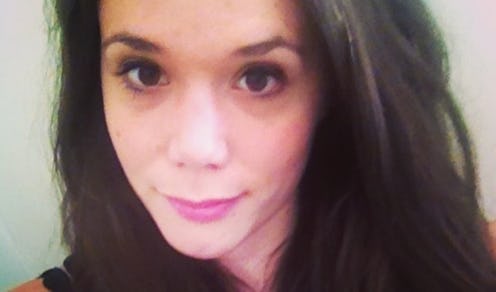
Despite the fact that society is becoming so much more open about it, we still get a lot of things wrong about bisexuality. As a bisexual who's only had the occasional hookup with women for years — but who is now dating a woman for the past year in and a half in the happiest relationship of my life — I've seen it from all angles. And I've seen a whole lot of misconceptions about bisexuality from the general public, from the queer community, from friends and family, from nearly everyone.
I think part of the problem comes from the fact that, for whatever reason, bisexuals are far more likely to be in heterosexual relationships — like 84 percent of them. "It goes back to societal 'norms,'" Amy Levine, sex coach and founder of Ignite Your Pleasure, tells Bustle. " I think some would say it's easier to be in a straight relationship. And it's simplifies having to explain to friends, family, co-workers etc. about their preferences. Not to mention, their preferred preference may be the opposite sex even though they may feel attraction and more to another gender."
But this means that bisexuality doesn't get enough exposure. We also don't even have the language for it — I still find it weird being described as being 'in a lesbian relationship' because there's no word for being in a relationship where one of you is bisexual. This sort of bi erasure means that misunderstandings about bisexuality can really flourish. Here's what we're still getting wrong:
1That We're Indecisive & Confused
Nope, it's not indecision. Just like it's not indecision if you like blondes and brunettes. It's just a matter of having multiple options that trip our trigger. To me it makes more sense that I would be attracted to everyone who is, well... attractive.
2That It's Just SO Hot Right Now
I think it's amazing that people are being more open about their sexuality and their curiosities. I am all for women talking about their experiences and being open about exploring attractions to other women. But it's not a 'trend', it's people finally being open enough to talk about something that's always been true. Women being attracted to women (and men being attracted to men) is not "trendy", it's just getting the exposure it deserves.
3That It's A Phase
Some lesbians are notoriously suspicious of bi girls and a lot of straight people just straight up don't believe in bisexuality — like it's a unicorn or something. In either case, you hear the word 'phase' way, way too much.
4That We're Less Likely To Be Faithful
Perhaps the natural end point of assuming that someone is indecisive or that we're just going through a phase is the idea that, ultimately, we're cheaters. We can't make up our minds, so we're less trustworthy and (apparently) will hop into bed with anyone. Studies have shown that bisexuals are perceived to be less faithful and less trustworthy.
It's nuts for two reasons: Firstly, your sexuality doesn't affect how moral you are. Also, it doesn't affect your sex drive. Some bisexuals will have really low sex drives, some will have high. But bottom line, we're not more likely to cheat.
6That We Don't Face The Same Prejudices
For some reason, not everyone takes the homophobia or biphobia bisexuals might face seriously. My lesbian girlfriend can vent about the same harassment that we both receive and get a really different response than I do as a bisexual. Maybe it's because everyone assumes that bisexuals are about to disappear into straight privilege at the first given opportunity, but it's not OK.
7That It's 50/50
This old chestnut. People are totally fascinated by the exact percentage breakdown of how much you're attracted to men versus women. And if it's not 50 percent, you're not "really bi." It's total nonsense. As is the idea that you're not bi unless you've hooked up with both sexes. You know who you're attracted to — and that's all it's about, really.
We've come a long way in terms of recognizing and accepting bisexuality, but there's still a way to go. Just keep an open mind and trust that we know what we want — and that's not in a phase — and we can begin to correct the misconceptions.